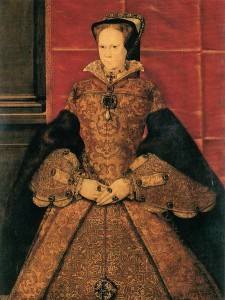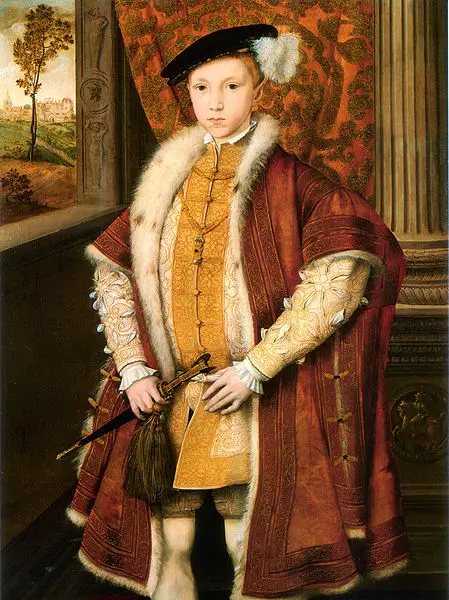
Mary I
"My lords, we greet you well and have received sure advertisement that our dearest brother the King and late sovereign lord is departed to God. Marry, which news, how they be woeful unto our hearts, He wholly knoweth to whose will and pleasure we must and do humbly submit us and our will.
But in this lamentable case, that is to wit now after his departure and death, concerning the Crown and governance of this Realm of England with the title of France and all things thereunto belonging, what has been provided by act of Parliament and the testament and last will of our death father – beside other circumstances advancing our right – the Realm know and all the world knoweth. The rolls and records appear by authority of the king our said father and the king our said brother and the subjects of this Realm, as we verily trust that there is no good true subject that is or can or will pretend to be ignorant hereof. And of our part, as God shall aid and strengthen us, we have ourselves caused and shall cause our right and title in this behalf to be published and proclaimed accordingly.
And, albeit this manner being so weighty, the manner seemeth strange that our said brother, dying upon Thursday at night last past, we hitherto had no knowledge from you thereof. Yet we considered your wisdoms and prudence to be such that having eftsoon among you debated, pondered, and well weighed this present case with our estate and your estate, the commonwealth, and all your honours, we shall and may conceive great hope and trust and much assurance in your loyalty and service, and that you will like noble men work the best.
Nevertheless, we are not ignorant of your consultations and provisions forcible, there with you assembled and prepared – by whom and to what end God and you know, and nature can but fear some evil. But be it that some consideration politic of some whatsoever reason hath hastily moved you thereto, yet doubt you not, my lords, we can take all these your doings in gracious part, being also right ready to remit and fully pardon the same freely, to eschew blood-shed and vengeance of those that can or will amend. Trusting also assuredly you will take and accept this grace and virtue in such good part as appeareth, and that we shall not be enforced to use the service of other our true subjects and friends which in this our just and rightful cause God, in whom our final affiance is, shall send us.
Wherefore, my lords, we require you and charge you, for that our allegiance which you owe to God and us, that, for your honour and the surety of your persons, you employ your selves and forthwith upon receipt hereof cause our right and title to the Crown and government of this realm to be proclaimed in our City of London and such other places as to your wisdoms shall seem good and as to this case appertaineth, not failing hereof, as our very trust is in you. And this letter signed with our hand shall be your sufficient warrant.
Given under our sign at our Manor of Kenninghall the 9th July 1553."1
Mary is stating her claim to the throne and asking for the Council's allegiance.
While Mary was writing this letter, John Dudley, Duke of Northumberland, was informing his daughter-in-law, Lady Jane Grey, of Edward VI's death and informing her that the King had nominated her as his successor. Jane collapsed weeping and declared "The crown is not my right and pleases me not. The Lady Mary is the rightful heir." Northumberland and Jane's parents, the Duke and Duchess of Suffolk, then explained Edward's wishes to the distressed Jane and she accepted the crown as her duty:
"Declaring to them my insufficiency, I greatly bewailed myself for the death of so noble a prince, and at the same time, turned myself to God, humbly praying and beseeching him, that if what was given to me was rightly and lawfully mine, his divine Majesty would grant me such grace and spirit that I might govern it to his glory and service and to the advantage of this realm."2
Notes and Sources
- Actes and Monuments, Book X, John Foxe - you can read this at http://www.johnfoxe.org/index.php?realm=text&edition=1583&pageid=1430&gototype=modern
- L’historia ecclesiastica della rivolvzion d’Inghilterra, Girolamo Pollini, quoted on p187 of Lady Jane Grey: A Tudor Mystery, Eric Ives.



Hello My Lords, you really didn’t mean to sign up for Jane our cousin did you and now we require you and give you the chance to put things right.
The true Queen Mary. Right My Lords?